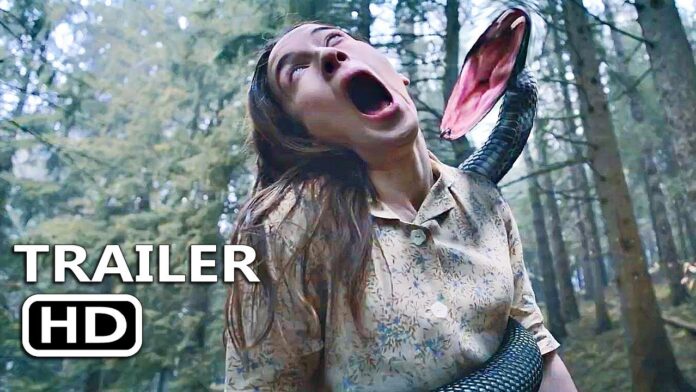The latest Hellboy reboot shifts to a supernatural horror focus, bringing new thrills and chills to the iconic comic book character
The new trailer for “Hellboy: The Crooked Man” has generated excitement among fans and horror enthusiasts alike. Set in the 1950s, this film features Hellboy, portrayed by Jack Kesy, as he delves into a rural Appalachian community with his fellow BPRD agent, Bobbie Jo Song, played by Adeline Rudolph. The duo soon discovers that the community is plagued by supernatural occurrences, with a witch problem at its core.
As they befriend locals like Tom Ferrell, played by Jefferson White, they encounter bizarre and unsettling phenomena, including a raccoon behaving in a disturbingly unnatural manner. The film promises a blend of supernatural horror with elements of dark comedy, as evidenced by scenes in the trailer where Hellboy interacts with a priest while preparing for battle and takes on supernatural creatures with physical prowess and wit.
The Crooked Man appears to aim for a balance between eerie atmospheric horror and more lighthearted, action-packed sequences. This tonal duality could distinguish it from the previous 2019 reboot, which had a mixed reception. By openly adapting the beloved comic miniseries by Mike Mignola and Richard Corbin, the film hopes to capture the essence of Hellboy’s darker stories while appealing to a broader audience.
Directed by Brian Taylor, the film also stars Martin Bassindale, Joseph Marcell, and Leah McNamara. “Hellboy: The Crooked Man” is set to hit theatres later this year, promising a fresh and intriguing take on the Hellboy universe.
Analysis:
Political:
“Hellboy: The Crooked Man” explores themes that resonate beyond its fictional narrative, subtly commenting on the social and political issues of the 1950s and their modern parallels. The film’s setting in a rural Appalachian community taps into the region’s historical context, often associated with poverty and marginalization. By highlighting a supernatural menace in this environment, the film could be seen as a metaphor for the socio-political struggles faced by such communities, including isolation, exploitation, and neglect.
Furthermore, the film’s depiction of a government agency (BPRD) intervening in local affairs raises questions about authority, governance, and the fine line between protection and intrusion. This reflects broader political discussions about the role of federal agencies in local matters, especially in areas perceived as being outside mainstream society.
Social:
The film also touches on social themes, particularly the idea of community and otherness. Hellboy, with his demonic appearance, represents an outsider who must navigate acceptance in a close-knit rural community. This mirrors real-world issues of prejudice, acceptance, and the fear of the unfamiliar.
By featuring a witch problem and supernatural elements, “The Crooked Man” delves into historical and contemporary societal fears of the unknown. The witch, a classic symbol of female power and societal fear, can be seen as a commentary on the treatment of women and those who defy societal norms. This narrative element could spark discussions on how societies deal with those who are perceived as different or threatening to the status quo.
Racial:
While the movie does not explicitly focus on racial themes, the setting in Appalachian communities, which have their own unique cultural and racial dynamics, might indirectly touch upon issues of race and ethnicity. The portrayal of the supernatural and the “other” could serve as an allegory for racial tensions and the historical exclusion or demonization of certain groups.
Moreover, casting decisions and character portrayals in such a culturally rich and complex setting could either reinforce stereotypes or offer a more nuanced exploration of regional identity and diversity. The film’s approach to these elements will determine its engagement with racial issues, either directly or through allegory.
Gender:
The inclusion of a female BPRD agent, Bobbie Jo Song, alongside Hellboy is notable, as it presents an opportunity to explore gender dynamics within the narrative. Her role and character development will be crucial in determining whether the film challenges or conforms to traditional gender stereotypes. The portrayal of witches in horror often intersects with ideas about female power, autonomy, and societal fears of women who do not conform to expected roles. This could provide a platform for exploring issues related to gender and power, especially in a period setting like the 1950s, known for its rigid gender norms.
Economic:
The film’s setting in a rural Appalachian community also brings economic themes to the forefront. These areas are often depicted as economically disadvantaged, and the introduction of supernatural elements could be seen as a metaphor for the struggles and challenges faced by such communities. The film might explore the impact of economic hardship on social cohesion and the susceptibility of communities to external threats, whether supernatural or real.
Furthermore, the production and marketing of “Hellboy: The Crooked Man” reflect broader economic trends in the film industry, such as the appeal of rebooting popular franchises to capture diverse audiences. The film’s success could influence future investment in genre films and adaptations, particularly those that offer fresh takes on established properties
